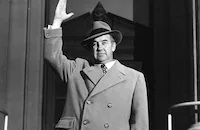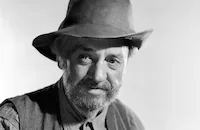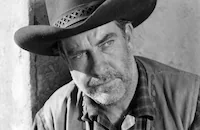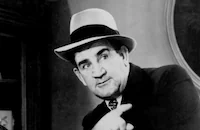Butch Minds the Baby
Cast & Crew
Albert S. Rogell
Virginia Bruce
Broderick Crawford
Dick Foran
Porter Hall
Richard Lane
Film Details
Technical Specs

Synopsis
After serving a ten-year sentence in Sing Sing, safecracker Aloysius "Butch" Grogan is thrown a "coming-out" party by his gangster friends Harry the Horse, "Squinty" Sweeny and Jack the Beefer. His friends are dismayed to learn, however, that Butch has decided to go straight, as he is a "three-time loser" who, according to the Baumes Law, would be sentenced to life in prison if convicted a fourth time. Later, Butch's self-appointed parole officer, policeman Dennis Devlin, demands that the ex-convict get an honest job, so Butch becomes a janitor in a tenement apartment building. He soon becomes friends with one of his building's tenants, widow Susie O'Neill. After the unemployed young mother attempts suicide, Butch gets Susie a job as a cigarette girl in a café owned by his old friend, Brandy Smith, much to the chagrin of Dennis, who has fallen in love with Susie. As Susie works nights, Butch agrees to take care of her infant son Michael Terence, and the ex-convict soon becomes emotionally attached to the young boy. Brandy, along with his henchmen, Squinty and Harry, asks Butch to crack a safe that holds a check that might implicate Brandy for income tax evasion. Butch refuses at first, then agrees to do the job when he learns that Dennis, who has been suspended from the police force, is involved in the conspiracy. It is the safecracker's intention, however, to botch the job in such a way as to force Dennis to make an arrest, and thus, be reinstated. Butch tells Brandy that, as payment for his participation in the crime, the café owner must agree to name baby Michael the $5,000 college scholarship winner in his annual Easter Walk Baby contest. Matters become further complicated the night of the crime when Butch is unable to find anyone to baby-sit for Michael, so he takes the baby with him. Butch then intentionally overloads the explosive charge, opens the safe, and makes his escape with both the check and Michael. Harry and Squinty are captured by the police, however, as the wounded Dennis had been working as an undercover agent all along. The next day, Butch agrees to give Brandy the check after Michael is awarded the scholarship, but the gangster double-crosses him. Dennis, however, grabs the check, and Brandy is immediately arrested. Unfortunately, Butch is arrested as well, but the district attorney, realizing Butch's true intentions, agrees to let the safe cracker award the $5,000 prize to Michael before he is taken away. After Butch's departure, the district attorney consoles Susie and hints that the ex-convict will be treated with leniency.

Director
Albert S. Rogell
Cast

Virginia Bruce

Broderick Crawford

Dick Foran

Porter Hall

Richard Lane

Shemp Howard
Rosina Galli
Joe King

Fuzzy Knight

Grant Withers

Russell Hicks
Baby Michael Barnitz
Tim Ryan
Frank Moran
Harold Barnitz
Six Hits And A Miss
Cliff Clark
Paul Mcvey

Tom Kennedy
Lou Lubin
Wade Boteler
Billy Wayne
Eddie Foster

Eddie Kane
James C. Morton
Henry Hall
Jack Gardner
Charles Sherlock
Joey Ray
Albert Ray
Henry Blair
Janet Ann Gallow
Charles Sullivan
Connie Leon
Frank Penny
Sammy Finn
Jimmy O'gatty
Caroline Cooke
Crew
Elwood Bredell
Bernard B. Brown
Milton Carruth
Howard Christie
Ralph M. Delacy
Jules Levey
Frank Moran
Jack Otterson
Charles Previn
Leonard Spigelgass
Vera West

Film Details
Technical Specs

Quotes
Trivia
Notes
Hollywood Reporter reported that Mayfair Productions purchased the film rights to two Damon Runyon stories-"Butch Minds the Baby" and "Tight Shoes"-in October 1940. Tight Shoes was produced in early 1941, but Butch Minds the Baby was delayed until early 1942, due to the production of another Mayfair film, Hellzapoppin' (see entries below). Actors Broderick Crawford, Richard Lane and Shemp Howard appeared together in both Tight Shoes and Butch Minds the Baby, and both pictures were directed by Albert S. Rogell. According to Hollywood Reporter, principal photography was completed on schedule on February 12, 1942, but additional scenes featuring thirteen-month-old Michael Barnitz in the role of "Michael Terence O'Neill" were later filmed, in order to build up the infant's part. Universal press materials state that over 100 children were tested for the role of Michael, and based on his performance in this film, Universal signed Barnitz to a term contract. Runyon's short story was made into a British film short in 1979 by Park Village Productions, a London commercial film company, under the direction of Peter Webb.












